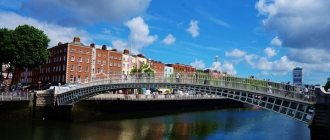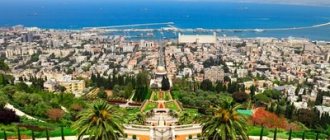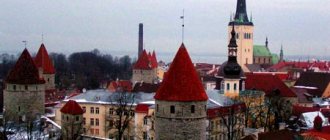Life in the UK: why immigrants flock there
The interest of immigrants in moving to the UK is largely due to the fact that this country has achieved enormous success in providing the highest standard of living for its citizens and guaranteeing them a high degree of social protection. Immigrants also have the right to social guarantees from the state. Moving to Foggy Albion is a multi-stage process; it can last 10 years or more, but in the end the efforts spent will not be in vain. Obtaining a British passport will automatically mean the onset of a new stage in life. The first step in the immigration process will be moving to the UK and obtaining a residence permit in this country.
It is called Great Britain, England, the United Kingdom, Britain, Foggy Albion, the Land of Fogs. And all this is about the same country. Great Britain is called England because historically it was from this largest province that the creation of the modern United Kingdom of Great Britain and Northern Ireland began, which includes England, Wales, Scotland and Northern Ireland.
The population of the modern United Kingdom exceeds 65 million inhabitants. Britons and immigrants who work in Albion can expect a minimum monthly wage of €1,545 after paying all taxes. The average salary after all deductions will be more than 2,500 euros per month. Britain is characterized by the absence of significant differences in wages in the city and province, as well as in different parts of the country . An immigrant can expect almost the same pay in London and in a small town in Northern Ireland.
The traditional currency of the United Kingdom is the British pound sterling. 1 GBP = 1.32 USD.
When considering immigration issues in the UK, one cannot fail to mention that today there are almost 8.5 million immigrants living in this country. The publication of these statistics on the eve of the referendum, which raised the issue of Britain's exit from the European Union, played a large role in the choice of British citizens. Traditionally conservative Britons are horrified that almost one in eight people in their country are immigrants. Therefore, it is believed that Brexit was largely due to the European migrant crisis, which was fully felt by British society, which is distinguished by its particular snobbery. But even after the decision to leave the EU was made, at least 300 thousand immigrants from all over the world arrive in Foggy Albion every year, maintaining a positive migration balance.
In 2021, it is estimated that nearly 180 thousand Russian-speaking immigrants from post-Soviet countries live in the UK. If we talk directly about Russians, then their number does not exceed 40 thousand, of which 95% live in England. And only 5% of Russians are scattered throughout the rest of the country. In London you can hear Russian spoken much more often than in any other city in Britain. And this is not surprising, because today there are 27 thousand Russians in the British capital.
On the streets of London you can hear Russian spoken much more often than in any other city in Britain.
In 2021, the UK continues to be one of the priority destinations for migration traffic from Russia. Russians go to Foggy Albion to work, study, and build a business. Many of them buy property in London, considering it a good investment. It's no secret that representatives of the wealthiest strata of Russian society consider it prestigious to own a house or apartment in Great Britain and especially in its capital.
According to experts in the field of immigration, in the near future the migration policy of the United Kingdom may become seriously tougher. The British desire to protect themselves from uninvited guests and the final severance of relations with the European Union will undoubtedly affect policy towards migrants.
Why do people think about emigrating to England?
Immigration to England from Russia is attractive due to its high salary level. In the capital, a qualified specialist receives an average of 3,500 pounds, which is equivalent to 290 thousand rubles. In the regions, wages are lower, but also not less than 2,120 pounds.
The country has a good climate; you don’t need a fur coat or air conditioning here. It rains and fogs no more often than in St. Petersburg, it is not hot in summer, and not very cold in winter.
Moving to England is attractive to young people. This is where the Universities of Oxford and Cambridge, which have been among the top ten best educational institutions in the world for several decades.
And of course, the country has a high level of culture. Even in the most remote towns there are theaters, museums, and exhibitions. At the same time, there is no need to wear a tailcoat; any self-expression in clothing and appearance is acceptable. Here they call it an “original outlook on life.”
Medicine in England is free for all residents, naturally, in government institutions. The ecology is also at a high level, because there are practically no industrial enterprises here, there are forests and parks everywhere.
Immigration to the UK: its pros and cons
Each of the potential immigrants, when deciding to move to Foggy Albion, plans to achieve their goal. And everyone’s goals are different, but there are certain general trends that can be considered positive when moving to the Land of Fogs. Let's list the main ones:
- the immigrant has the right to live long-term and legally in this country, joining the greatest cultural heritage of the British nation;
- an immigrant has the right to engage in entrepreneurship, open their own companies, their branches and develop business in almost any area of the economy;
- migrant workers have the right to legal employment in the United Kingdom;
- an immigrant can count on social guarantees from the state;
- Having received a residence permit, you can systematically move on to the remaining stages of naturalization;
- immigrants can easily obtain Schengen visas, which will be required to travel to mainland Europe;
- tolerance of the British authorities towards representatives of the Russian people. This statement is also true for native Britons;
- the prevalence of the English language, which many potential Russian immigrants begin to study in the first grade of school.
Moving to the UK opens up a wide range of business opportunities; residence in this country allows you to optimize taxation. Entrepreneurs in the UK enjoy significant benefits during the first three years after registering their own business.
But the process of immigration to the UK should hardly be viewed only from a positive point of view. It also has significant disadvantages. We list the main ones:
- Britain is considered an expensive country to live in. Prices in British supermarkets are significantly higher than the European average. Even for a Russian who has visited many European countries and gotten used to price tags in European stores, everything here will be very expensive;
- real estate in London is considered not only elite, but also incredibly expensive. London itself is one of the five most expensive cities in the world;
- The British labor market is highly competitive among representatives of almost all professions. An important negative factor is that a Russian specialist who has a domestic diploma must nostrify it in Britain, since educational documents issued in post-Soviet countries (with the exception of the Baltic republics that are members of the European Union) are not accepted in this country. The nostrification procedure will take a long time and, in addition, it is quite expensive;
- The mentality of the British is significantly different from the Russian one. In addition, in each part of the United Kingdom there are differences in traditions, ways of life and even a certain difference in language;
- In light of the UK's exit from the European Union, immigration legislation is expected to become tougher, which may become an obstacle to the process of further naturalization, for which additional grounds will be required.
There are many more advantages and disadvantages of moving to Foggy Albion, but each immigrant can view them based on their individual situation.
Video: facts about Great Britain
Immigration through investment and work
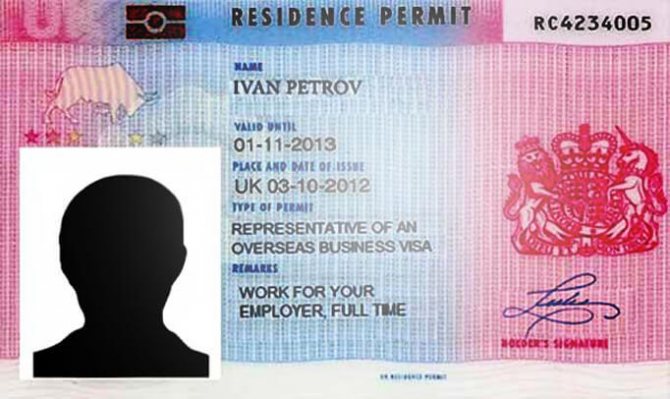
Residence permit card in England with the right to work
To move to an island country for work, you must obtain a work visa. According to the migration rules, applicants for work and student entry documents are divided into 5 categories. The first three are for work visa candidates:
- Category 1. This includes businessmen and investors. Entry document applicants are required to invest money in creating their own enterprise or the British economy (75% are invested in bonds or shares, 25% in real estate or deposit accounts).
- Category 2. Intended for qualified workers with an offer of employment in hand. When requesting a visa, you must present a certificate issued by a licensed British company.
- Category 3. Suitable for residents of Russia only if they have a passport from one of the EU countries. The category was created for unskilled workers from EU countries. However, the number of visas issued is limited.
Important! Visas for highly qualified specialists, issued on a point system, have been cancelled. Previously, high-quality workers were included in the same category as entrepreneurs and investors.
Review of the main methods of immigration to the United Kingdom in 2021
Immigration laws in the United Kingdom are currently largely similar to those in the European Union. Therefore, immigration methods are in many ways similar to those that exist in EU countries. Intending to move to the UK, hypothetical immigrants are engaged in the selection of optimal programs that can most likely ensure that they achieve this goal. That is why it is worth not only listing the main ways to move to the United Kingdom, but also considering each of them in detail.
Moving to Britain for work
There are no exact statistics, but experts say that almost every second immigrant from Russia moves to the UK to work. Working in this country provides the opportunity not only for high earnings, but also for career growth. After all, the fact in the autobiography that the job seeker (if he needs to look for it in another country) has relevant experience in the UK will become an undeniable competitive advantage for him.
The law obliges British employers to prioritize the employment of their fellow citizens. Nationals of any EU country are considered second, and only after that are migrant workers from third countries given the opportunity to get official work. The third country in this case is the Russian Federation. British employers are interested in highly qualified specialists. It is with them that labor contracts are most often signed. This country welcomes professionals in their field, although the category of low-skilled migrant workers will also not be left without attention. In a certain sense of the word, British employers gravitate towards Europeans, since in almost every cafe, bar, restaurant, factory floor, and car park, immigrants from Southeast Asia work: Chinese, Pakistanis, Thai citizens. Therefore, a local employer is more likely to hire a Russian labor migrant than a person from, for example, Indochina. Citizens of India have a certain priority when hiring, since this country is part of the British Commonwealth of Nations, which is, in a certain sense of the word, the successor to the British colonial empire.
The British Commonwealth of Nations includes 53 independent states. Each of them is, to one degree or another, connected economically and politically with Great Britain. The vast majority of members of this interstate formation are former British colonies. Being part of the empire left a noticeable imprint on the current state structure of these countries and on their legislation. In addition, citizens of a country that is a member of the British Commonwealth of Nations have certain benefits when immigrating to their former metropolis.
To be legalized in the UK, a Russian labor migrant must contact the British Embassy in the Russian Federation and obtain a working-type visa. This can be done by providing a valid employment contract from a UK employer and an invitation from them to move to work. Having arrived in the United Kingdom, a Russian specialist must submit documents to the migration service to obtain a residence permit. British laws require employers to bear all the hassle and costs of legalizing their foreign workers.
Video: working in the UK
A separate category of labor migration includes the move to Britain of specialists with professions that are especially in demand in the British economy. In this case, the possibility of immigration is determined by the accrual of points (their maximum can be 100). When calculating points, the age of the potential immigrant will be taken into account, how in demand his profession is, what qualifications he has and how much specialized work experience he has. Accordingly, a higher score means a greater likelihood of obtaining immigration status in the United Kingdom. A special feature for foreign professionals is the need to confirm the availability of sufficient funds to live in Britain for three months. This period is determined based on the duration of the search for an employer. In this case, to obtain an entry permit, a foreign professional does not need to provide a work contract and an invitation from the employer. But if he does not find suitable work within a three-month period, he will have to leave the country. If during this time an employment contract is concluded, then on its basis a residence permit is issued directly in the UK itself.
I happened to hear the story of a Russian labor migrant who moved to England four years ago. According to him, the immigration process in this country cannot be categorized as a simple task. British migration legislation is extremely bureaucratic, so it is advisable to take with you all the documents relating to your education, family status and the availability of sufficient funds to live in this far from cheap state. Andrey (that was the name of my interlocutor) had his diploma from a Russian university nostrified while working in Slovakia, where he stayed for three years before moving to the UK. He recommends that future immigrants to the UK with higher education have their diplomas nostrified in any Eastern European country. It is advisable to choose a Slavic-speaking state, where it is easier to pass all disciplines by learning a language that has many similarities with Russian. Slovakia was quite suitable for this. In addition, the procedure itself in this country cost him three times less than it could have cost him in the UK. Having received confirmation of his qualifications, he was able to find work in Foggy Albion without much difficulty. In Slovakia, Andrei worked as a builder, although he had an economic education. He has already gone to Britain as a manager of one of the banks. Imagine his surprise when, in a relatively small team of fifty employees, he discovered another half a dozen of his compatriots who had gone through approximately the same path as him. If an immigrant belonging to this category does not have sufficient funds to live in England at first (the presence of a minimum amount is confirmed by bank statements, but in fact these funds are not enough, since in the first months it is necessary to take care of renting housing, processing transfers, and so on ), then when concluding an employment contract with an employer, you can stipulate the provision of “lift benefits” to your foreign employee. In Britain this is common practice, so there is no need to be complex in this case. In the future, this amount will be deducted from your salary, but it will be of great help at the initial stage of life in Foggy Albion.
Immigration for education
Millions of students from all over the world dream of getting a higher education in the UK. Russian students, of course, are no exception in this case. A diploma from Oxford University opens the door to the most successful companies in the world, there are no problems with it during employment, it does not require nostrification, and a graduate of a British university is considered as a first-priority candidate for employment. There are many highly ranked higher education institutions in Britain where you can get high-quality and often relatively inexpensive education. Studying in this country itself is quite expensive, but various grants and scholarships are available for students, which in many ways help to successfully realize their dream of obtaining a British diploma. Having entered a British higher education institution, a student receives an invitation to study from it, and a corresponding contract is also signed with him. With these documents, he goes to the British embassy in his homeland and applies for a student visa (for remote admission). Then he comes to the UK on this visa and, over the course of a three-month period, obtains a residence permit there. If a Russian student personally took the exams upon admission to a British university, being legally on British territory, then he can immediately, on the basis of the specified documents, begin to obtain a residence permit.
By the way, there are a lot of foreigners studying here. Not only in my college, but in Britain in general. Especially in London. The guys come from different countries, but mostly from India and China. As for future prospects and career, a British diploma will definitely not be superfluous. Especially for those who want to stay here after graduation and find a good job. Now the situation with obtaining work visas for foreigners has become noticeably more complicated.
Olga Sedykh
https://www.the-village.ru/village/business/go/236013-velikobritaniya
British immigration rules allow permanent residence only after completion of studies at any of the departments of a higher education institution. The rules for foreign students in this case are somewhat stricter than in many European countries, where you can become a permanent resident by studying at the master's and doctoral level. International students can work part-time in Britain throughout the year. Working hours are limited to 20 hours during the week during school and 40 hours during vacations.
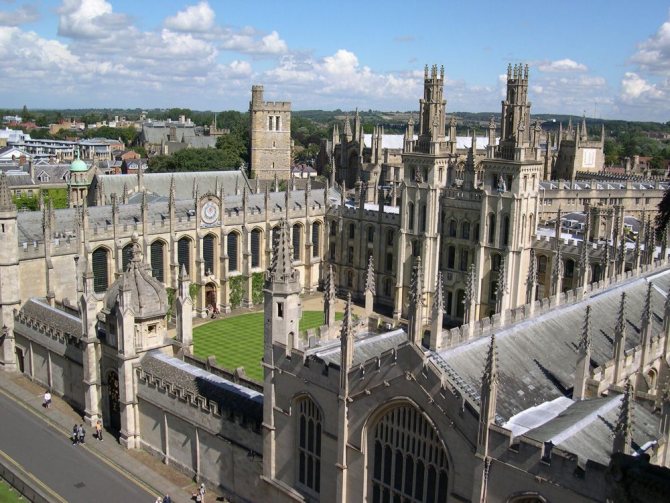
Oxford University is one of the oldest universities in Europe
Marriage
Legal consequences occur in the UK for both registered and unregistered marriages. A prerequisite is that both spouses must be of majority age. For a foreign spouse, on the basis of a marriage certificate, a residence permit is issued for a two-year period. Permanent residence is issued in the third year of marriage, you must live there for three years. A foreign spouse will only be able to obtain a British passport after five years. If a child is born in the marriage, then it is immediately possible to apply for British citizenship.
No invitations will be required for a foreign spouse if the marriage is official. The main document in this case will be a certificate of it. But in case of an unofficial marriage, a British citizen must issue a special invitation to his other half, which is registered with the migration service.
Mixed marriages are especially strictly controlled by the British migration authorities, because history knows many cases when foreigners immigrated to Foggy Albion and received British citizenship through a fictitious marriage. If such a criminal alliance is discovered, the British citizen involved in it could go to jail for a year, and the foreign life partner will be deported with an entry ban of 10 years.

No invitations will be required for a foreign spouse if the marriage is official
Business immigration
In 2011, the British government significantly eased immigration regulations for foreign businessmen, spreading out a kind of “red carpet” for them. Liberalization was largely due to the need to restore the British economy after the crisis. To immigrate to the UK, you will need to register your own company or its branch in this country . The owner of the business must also be its official manager. A foreign businessman receives a residence permit for a period of two years. The status is then extended, but only based on the results of official business monitoring. If it is found to be effective and cost-effective, then the British authorities issue an appropriate conclusion, with which the businessman applies to the immigration service and extends his immigration status. Overseas businessmen working in the UK have the right to invite their families to move with them.
Even if there are some difficulties, there are still more positive things. Yes, they believe the advertising, but at the same time they respect the laws and respect the rights of others. Everyone is smiling. You push someone by accident, and the answer is “sorry.” There is no crime as such. Local “crime of the century”: one girl, after relaxing in a nightclub, got into a taxi at 3 am and disappeared. In general, the taxi driver raped and killed her. They immediately organized groups of volunteers and searched for the girl. Specials on local TV. Everyone was talking about this. On the day of the funeral, ALL businesses lined up people for a minute of silence.
meh30
https://nesiditsa.ru/emigration/emigratsiya-v-angliyu
Immigration by Investment
There are special immigration conditions for foreign investors in the UK. But the entry threshold for participation in the immigration program is very high. The minimum investment capital must be £2 million. In this case, the investor receives a special residence permit for a period of 40 months. Upon completion, immigration status can be extended once for another two years. These are standard conditions for foreign investors. But British migration legislation is characterized by differences in the periods during which foreign investors can legally reside in the country before obtaining permanent resident status. When investing 2 million pounds sterling, you will have to wait for permanent residence for five years, when investing 5 million - three years, and owners of foreign capital who have invested at least 10 million pounds sterling in the British economy can count on receiving permanent residence in just two years.
Potential investors must initially apply to invest. It should be noted that the prospect of attracting budget funds is not considered in this case. The option of placing invested funds using offshore companies is also excluded. It is prohibited to purchase shares of companies that invest their funds in the construction business, as well as investing in real estate that assumes that it will be rented out in the future. In addition, the legal origin of the capital must be confirmed.

The minimum investment capital must be £2 million
Reunion with relatives
You can move to Britain on the basis of an invitation from close relatives living in this country. The document is certified by the migration service, but only if confirmation of close family ties is provided. Invited relatives with this document are sent to the British diplomatic mission in their country to obtain a visa. Upon arrival in the UK, they apply to become temporary residents. A necessary condition in this case is confirmation by the inviting person of his sufficient level of well-being, which will make it possible to provide those who have moved a roof over their heads and financial support for the first time of their stay in the country.
There are savings that I invest in our life together. If anyone doesn’t know, you can’t work here for the first 6 months (on my visa), but at the same time, I worked unofficially for a couple of months (helped friends with children). In the near future, I will start looking for a job in my profile. I am aware that, at best, this will be an assistant to an assistant to a junior assistant, but this does not scare me. I consider this starting position as a good chance to improve my English in my profession. areas. During these 8 months, I managed to thoroughly prepare for passing my license (this is not an easy matter here).
gertrud_a
https://pora-valit.livejournal.com/2631766.html
Immigration for refugees
The vast majority of refugees in modern Britain come from the most depressed regions of the world, where famine and war are raging. It is also possible for a Russian to become a refugee in this country if in his homeland he is threatened with political persecution, persecution for his religion, nationality or, for example, for his sexual orientation.
Forced migrants can only count on refugee status if they can provide compelling evidence that they are in serious danger in their home country. Refugee status is issued for a five-year period, after which the British authorities monitor the situation and decide whether the forced migrant can return to his homeland or whether he should still stay in Britain. In the latter case, the refugee will be given permanent resident status, and after five years there, he can become the holder of a British passport.
Video: ways to move to the UK
Grocery costs for those living in the UK
It is important for every student to distribute their finances for household needs: food, housing, utility bills. When people come to a new country, they become interested in food prices, since this is how they can understand what to expect financially from the new country.
Food prices in Britain vary by region. We have prepared for you a table of the main food products that are present in every person’s diet, as well as the average price for them.
| Products | Price in pounds |
| Dairy | From 0.50 to 1.5 |
| Bread | 1 |
| kilogram of rice | 1,3 |
| A kilo of cheese | 6 |
| Vegetables | 0,50-1,5 |
| Chicken | 6 |
| Fruits | 1,5-2 |
The price of food corresponds to British wages, which is a disadvantage of living in England for migrants. And those people who smoke pay about 8 pounds for one pack of cigarettes. Prices for tobacco products surprise tourists the most.

The British are quite selective when it comes to food and drink. The basic diet of an Englishman includes:
- Morning breakfast. For an ordinary Englishman, the morning begins with a cup of tea or coffee, followed by a hearty breakfast. The first meal should be the most nutritious to give you energy for the whole day. May include several dishes at once: oatmeal, scrambled eggs and bacon, jam with a bun, beans in tomato sauce and more.
- Lunch, or as the indigenous population calls it, second breakfast, usually takes place in a cafe or restaurant. At this time, everyone is at work, so going home to have lunch is completely inconvenient. It includes: meat or fish, a side dish of various vegetables, salads, bruschetta, cheese and more.
- The typical English dinner takes place late, and for many families it is the most important meal of the day as everyone is reunited around the table. Dinner almost always includes a meat dish (wings, steak, chops) and a side dish of vegetables.
The British spend the most on meat and meat products, as they are included in almost all meals. They also do not refuse to visit a restaurant with their friends or family. When it comes to saving on groceries, the British simply buy in large quantities if there are no promotions. For example, buying a large tray of eggs is cheaper than buying two small ones.
Main stages of the immigration process
The first step in the immigration process is to obtain a UK visa. To do this, you must visit the British Embassy in the Russian Federation or a visa center. Before contacting visa centers, you should inquire about the regions of their consular jurisdiction and find out whether they issue the appropriate type of visa.
British immigration legislation is very regulated in everything. There are 2 types, 5 categories and more than 30 types of UK visas. Many visas have subtypes, for example, a work visa can be issued to a temporary worker, a young specialist, a permanent low-skilled worker, and so on. There are 10 subtypes of the work visa alone. We will consider only the main types of UK visas. They can be:
- immigration;
- non-immigrant.
With the first category of visa, a foreigner can come to Britain and begin the path of naturalization. With a non-immigrant visa, he can only count on a more or less long stay in the United Kingdom, then he must leave it or change (if there are sufficient grounds) the type of visa to an immigration one. In this case, you can request a residence permit and so on.
To stay in the UK for more than three months, you must obtain a residence permit. It can be temporary or permanent. A temporary residence permit allows its holder to legally reside in the UK for one to two years (depending on the type of residence permit). Further, the status must be extended; the extension period is also individual for each category of applicant. The prospect of obtaining a permanent residence permit (PR) for the vast majority of applicants opens after a five-year period of residence with a temporary residence permit. The exception is foreign spouses and certain categories of investors.
Permanent residence means that the holder can legally reside in the UK indefinitely. The immigration status document itself must be updated periodically. In the UK, a ten-year period is provided for this.
After five years of living in the UK with permanent residence, you can begin to obtain citizenship. To do this, during the last two years before applying for citizenship, you must be absent from British territory for no more than three months in total.
Acceptance of British citizenship is regulated by the Nationality Act, adopted back in 1981. To become a subject of Her Majesty Elizabeth II, you must meet many requirements, one of which is the successful completion of language and integration testing.
Advantages and disadvantages of permanent residence in England
| Pros + | Minuses - |
| High salaries | Paperwork |
| Comfortable standard of living | Taxation |
| Prospects, especially for business development | High real estate prices |
| Culturally developed country | Difference in mentality |
| Opportunity to travel around Europe | Language problems |
| A large number of cultural and leisure places | High prices for some products |
| Russian diaspora |
What documents should be submitted when immigrating?
Registration of this first immigration status (temporary residence permit) will require the submission of the following documents:
- a valid foreign passport and its certified photocopy;
- application, which must be completed online following the instructions provided;
- four photographs;
- certificate stating that the immigrant is not a carrier of the tuberculosis virus. The certificate can be issued during an examination in a British public clinic or in the applicant’s homeland in an accredited clinic;
- confirmation of one’s own solvency;
- documentary evidence of the reason on which immigration status is requested;
- certificates of no criminal record in the Russian Federation;
- proof of residence in the UK. This may be a rental agreement for living space or an extract from the state register of the right to own residential real estate. If an employer guarantees the provision of housing to its foreign employee, then there must be a corresponding attitude from him;
- receipts for payment of all administration fees.
Documentation must be submitted exclusively in English. Translations are certified by an apostille. Documentation issued in any EU country will not require translation or certification. It is possible that British immigration officials will want to see additional documentation related to proof of solvency or grounds for immigration.
Minors require a birth certificate and the presence of both parents during the procedure for obtaining a residence permit. If immigration status is obtained with only one of them, then the second must contact a notary and issue his written consent that his offspring will become a temporary resident of the UK. The impossibility of obtaining such consent must be confirmed by relevant documents, for example, a death certificate.
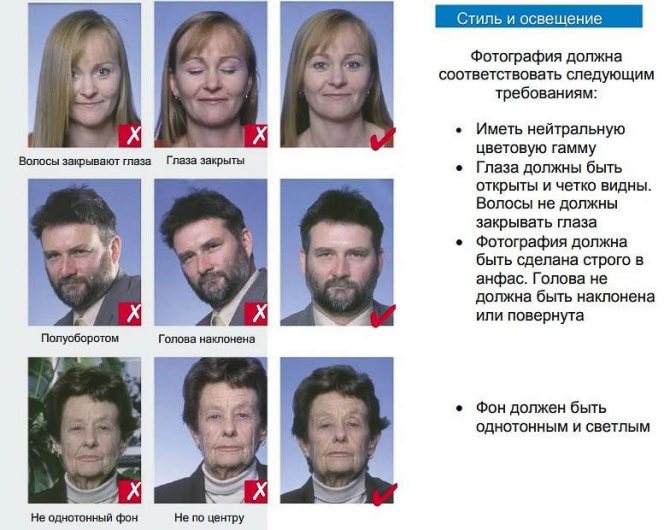
There are strict requirements for photographs
Adaptation on the spot: life in England through the eyes of Russians
Migration is one of the most stressful situations for a person, since he finds himself in a different, completely alien environment. Despite the fact that moving to a new country, especially if it is large and progressive, is always a holiday and joy in the initial stages. But, unfortunately, as soon as a person begins to encounter difficulties in language, mentality and other aspects, life becomes much more difficult and no longer seems ideal.
The main difficulties in adaptation on site:
- Left side traffic. For residents of Russia and the CIS countries, it is quite difficult to get used to driving on the left in Britain, especially if the car has a manual gearbox.
- The language barrier. Even with a good knowledge of English, at first it will be difficult for visitors to maintain a collective conversation or understand some slang expressions, since England has a huge number of dialects and accents.
- Payment of utility bills, the system of which should be understood.
To make it more comfortable for a Russian person to adapt to a new place, he should find new friends not only among locals, but also among fellow migrants. They are ready to help their fellow countrymen and, moreover, have extensive experience of living in a new country.
To master the language perfectly, you can enroll in courses. In every city in Britain there are schools where migrants are constantly accepted and taught both grammar and spoken English. Most of the courses are paid, but if you search hard, you will find a couple of language evening schools that offer free training. For example, such as Learn Direct, ESOL, Friends Center.
Sometimes people offer to exchange language knowledge, that is, you teach them Russian, Ukrainian, Belarusian or another, and they teach you English.
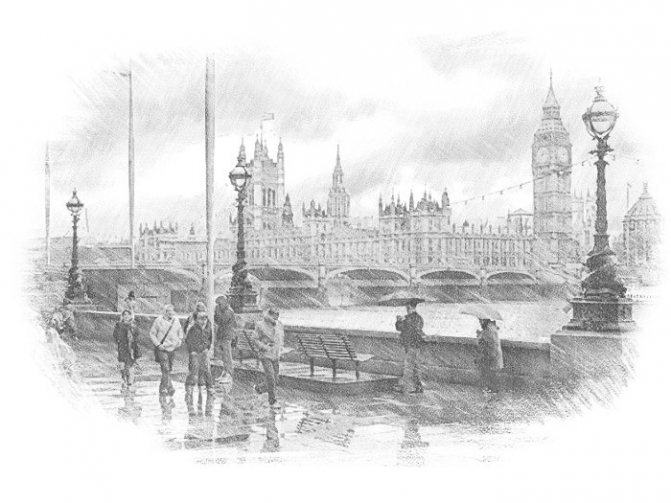
Features of registration of immigration status
You must apply for immigration status through UKVI or the UK Visa Application Center in your home country (depending on the basis). And then get a card from UKVI. This is the name of the British Migration Service, whose responsibilities include working with all immigrants staying in the United Kingdom. There is a representative office of the migration service in almost every administrative center of the country.
The cost of obtaining a residence permit differs for different categories of applicants. The status will cost investors the most (£1,204), and the least expensive status will cost students (‘only’ £186).
The status is issued within two weeks, allotted for this by British legislation.
The applicant for a residence permit will not need to confirm his English language proficiency. This will be necessary during further stages of naturalization.
The price of permanent residence is fixed, it will be 1875 pounds. Minors under 12 years old become permanent residents for free, older ones have a 50% discount.
This year marks 5 years since we immigrated to England. In this regard, I often remember our first days here - how many hopes, expectations and illusions were associated with this country. However, the decision to stay in England did not come to us right away: in the first year, my husband and I only looked closely at the country and hesitated with the choice, because in Moscow we still had family and friends, an established life and a settled way of life. We were finally confirmed in our decision only after moving to London - it’s impossible not to fall in love with this city, and after living in it for at least a month, you want to stay here forever.
Maria Rainbow
https://www.ru-uk.net/blog/item/181-moya-immigratsiya-v-angliyu-ozhidaniya-vs-realnost.html
Russian diaspora in Great Britain
Migrants from Russia try to support each other in a foreign country:
The peculiarities of the Russian diaspora in England are such that they certainly will not refuse to help their compatriots. The easiest way to meet Russian people is in relevant stores and restaurants, and also to communicate with them through a group on Facebook.
Where do Russian immigrants live? Most Russians are in London and among themselves they call the capital “Londongrad”.
Opinions of those who moved to England
Review 1: “We moved with our family to the UK 5 years ago and began to develop our business there. There were no problems with the work, but the same cannot be said about the language. The first year it was difficult to understand the local population because of their accent, but after that everyone got used to it.”
Review 2: “I came to the country to undergo training, the quality of which impressed me greatly. However, I would like to note that if it were not for the scholarship, I would not be able to exist here financially. Education is high-quality, but expensive, like everything else here.”
Review 3: “3 years ago I was offered a contract in London. I am an architect by profession and, without hesitation, I accepted this offer. Many thanks to our responsive Russian diaspora. If it weren’t for them, adaptation to a new country would have been much more difficult.”
Arts and culture
In the country where Shakespeare himself worked, it is impossible to be indifferent to the theater. It is this temple of art that today is one of the important parts of the cultural life of Great Britain. In every city in the country, even the smallest, there are theaters that offer audiences performances for every taste.
Numerous museums and exhibitions also speak about the rich spiritual life in Great Britain. There are quite a lot of creative people in the country who organize fashion shows, demonstrate graffiti art, and are also interested in music and cinema. Every resident of Britain finds something to their liking. In addition, Russian emigrants note that this country is characterized by freedom of expression. No one will cast sidelong glances at young people wearing bright clothes and a mohawk on their heads. Here it is considered an "original representation of the world."
